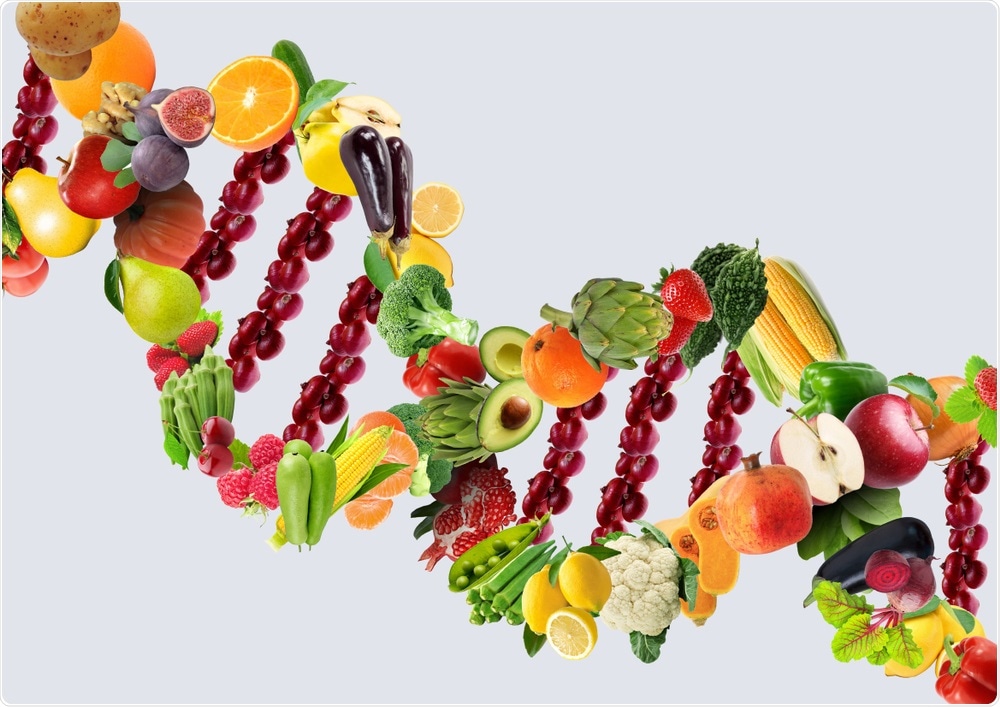Most people know that genes are inherited from parents and that the DNA from those parents combines to create an individual’s unique genetic makeup. This determines aspects of phenotype such as eye color and height, but also more complicated traits such as metabolism and susceptibility to disease.
DNA-based diets are nutritional recommendations that are based on the genetic profile of an individual. Advocates of DNA-based diets say there is evidence to suggest that people metabolize carbohydrates, protein, and fats differently based on their genetic makeup.
Now, experts in the field of nutrigenetics say that by better understanding how a person responds to specific nutrients, healthcare practitioners could provide better advice about nutrition.
 AYDIN OZON | Shutterstock
AYDIN OZON | Shutterstock
During the 13-year Human Genome Project, researchers discovered about 50,000 variances in the genetic code that influence how the body functions. What many people are not aware of is that there is a significant relationship between a person’s genes and their environment and that diet is one of the most modifiable elements of that environment. This has led to the development of a scientific field called nutrigenetics, which studies how the genetic variances influence a person’s response to diet.
While a healthy diet that includes a range of whole foods may help to mitigate many of the variances, some of the controversy surrounding what a healthy diet may be partly influenced by an individual’s specific genetic variances.
For example, one nutrient that is not talked about much is choline, a compound which is present in egg yolks. When health officials started to encourage the reduction of dietary cholesterol as part of maintaining hearth health, people started to regard egg yolks as unhealthy.
While lowering cholesterol intake may have a beneficial effect for some people, those in the field of nutrigenetics have found several variances that may confer unhealthy outcomes such as muscle loss, infertility and fatty liver when individuals do not consume enough choline.
Other examples of nutrients that may be influenced by the variances include saturated fat, salt and vitamin D. The contradictory findings that researchers have reported about these nutrients may be at least in part due to the genetic variation between individuals that dictates how they respond to these nutrients.
While most health experts agree that too much saturated fat can make people unhealthy, the increasing popularity of high-fat, low-carbohydrate diets has led many people to disagree with this.
One expert in the nutrigenetics field, Jose Ordovas (Tufts University) found that a variance in the APOA2 gene influences a people’s likelihood of gaining weight when they consume a lot of saturated fat. People who had a certain APOA2 variance were significantly more likely to be overweight and to have poor heart health.
Researchers have also found variances that influence how dietary salt affects blood pressure, with dietary salt reduction being more important for some people than others. For some individuals, salt reduction is particularly important for maintaining a healthy blood pressure, but for up to 11% of the population, lowering salt intake can raise blood pressure, says Ordovas.
There is also a significant genetic component to obesity. In 2012, researchers at Harvard University found that a variance in the FTO gene significantly predicted whether people lost more weight when following a high-protein diet and less weight when following a low-protein diet.
You’re more likely to stick to a DNA-based diet
Adhering to a dietary plan is an essential part of weight loss and overall health improvement. Nutrigenetics expert Ahmed El-Sohemy from the University of Toronto says gene-guided dietary interventions improve adherence to recommendations.
El-Sohemy was one of the first people to show how diets guided by genetic information significantly improved people’s salt reduction. More recently, a study showed that behavioral changes based on genetic information increased the likelihood of people adhering to lifestyle recommendations.
Despite a lack of consensus between experts over gene-guided diets, many companies are selling gene-based diets and nutrition programs.
The DNA Diet is a diet and lifestyle program that is tailored to an individual once they have had their DNA tested, but whether the particular genetic variants the company uses actually result in improved weight loss has not been adequately researched.
Overall, my take is that while some of these tests may provide a genuinely helpful tidbit here or there, they are generally based on science that is not nearly established enough to rely on. Right now, there is no solid evidence that eating a certain diet based on your specific genes will make you slimmer, happier, or healthier.’
Keri Glassman, Dietician (via NutritiousLife.com)
Many companies are using DNA testing to personalize recommendations for individuals, but the evidence is not yet robust enough to support that this really does improve weight loss.
Personalized ‘medical foods’ may be on the horizon
One potentially useful application of nutrigenetics is the development of “medical foods,” which are based on genetic testing that identifies problems with metabolism and are designed to overcome these problems by providing certain nutrients.
Director of the Nutrition Research Institute, Steve Zeisel, believes medical foods potentially improve long-term compliance with gene-guided dietary recommendations.
It is still early days for the field of nutrigenetics and a lot more research is needed, but most experts agree that although evidence will continue to emerge over the next ten years, there is sufficient evidence now to suggest that field can be useful.
Using genetic information effectively to guide recommendations that are tailored to an individual’s nutritional needs requires a lot more than simply testing DNA for certain genetic variances and the approach should only be carried out by a qualified healthcare practitioner.
Practitioners should be aware of how to incorporate the genetic information as one of several factors that need to be taken into account, including blood test results, the gut microbiome, assessment of health risks and the most recent methods available for assessing nutrients and metabolism.
Source:
Dr. Melina Jampolis. CNN. The DNA diet: How knowing your genes can help you fit into your jeans. cnn.com.